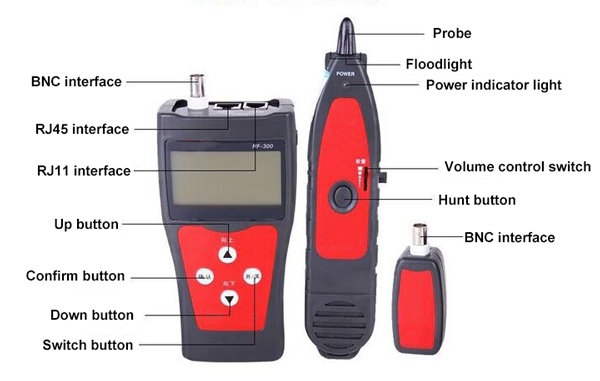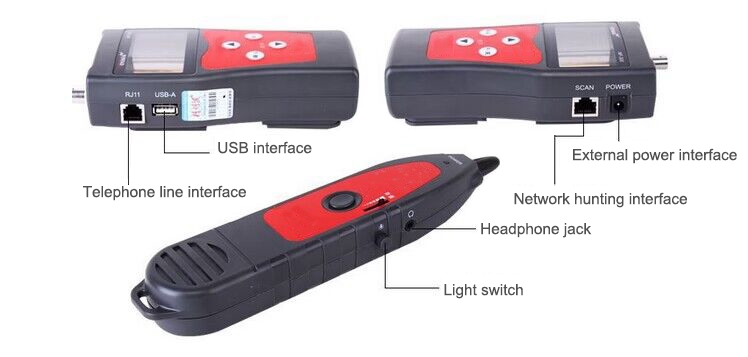A network cable tester, also commonly known as a professional network tester or network detector, is a portable, visual, intelligent testing device that can detect the operating conditions of the physical layer, data link layer, and network layer defined by the OSI model. It is mainly suitable for local area networks. In fault detection, maintenance and integrated wiring construction, the functions of the network tester cover the physical layer, data link layer and network layer.
Basic components

Network tester classification
Network cable testers can be classified into different categories based on various criteria:
Transmission Medium
- Wireless Network Testers: Tools designed for assessing and troubleshooting wireless network infrastructures.
- Wired Network Testers: Instruments specifically tailored for evaluating and diagnosing wired network connections.
Functionality
- Cable Testers: Devices focused on the inspection and assessment of network cables, checking for continuity and potential faults.
- Multifunctional Network Testers: Versatile tools that combine various functions to address multiple testing needs within a network.
- Network Performance Testers: Instruments designed to evaluate and optimize the overall performance of a network.
Purpose
- Network Construction Equipment: Tools utilized during the setup and installation phases of network infrastructure.
- Network Maintenance Equipment: Instruments employed for ongoing maintenance, troubleshooting, and optimization of network components.
Network Cable Tester Application
Network cable testers find wide-ranging applications in the field of information technology and networking. These versatile tools play a crucial role in ensuring the health and efficiency of network infrastructures. Below are some key applications of network cable testers:
Installation and Maintenance
- Cable Continuity Testing: Network cable testers are essential during the installation phase to verify the continuity of cables. They help ensure that all wires are properly connected, reducing the likelihood of connectivity issues.
- Fault Detection: In maintenance scenarios, network cable testers are employed to detect faults such as breaks, shorts, or crossed wires. This is critical for identifying and addressing issues that may arise over time.
Troubleshooting
- Quick Issue Identification: When network connectivity issues arise, network cable testers are invaluable for swiftly identifying the source of the problem. Whether it's a faulty cable or misconfigured wiring, the tester provides clarity for effective troubleshooting.
Network Upgrades and Expansions
- Compatibility Testing: During network upgrades or expansions, where new cables are integrated with existing infrastructure, network cable testers help ensure compatibility and proper integration. This reduces the risk of compatibility-related issues that can hinder network performance.
Certification and Validation
- Compliance Testing: In industries where compliance with specific standards is crucial, network cable testers play a role in certifying that cables meet established industry standards. This is essential for maintaining the quality and reliability of network connections.
Quality Assurance
- Preventive Maintenance: Regular testing using network cable testers as part of preventive maintenance practices helps identify potential issues before they escalate. This proactive approach minimizes downtime and ensures a consistently high level of network performance.
Data Center Management
- Rack Organization: In data centers, where cable management is critical, network cable testers assist in ensuring that cables are correctly connected and organized within racks. This contributes to an efficient and well-maintained data center environment.
Educational and Training Purposes
- Learning Tool: Network cable testers serve as valuable educational tools for students and professionals learning about network infrastructure. They provide hands-on experience in understanding cable configurations and troubleshooting techniques.
Security System Installation
- Surveillance Systems: In the installation of security systems that rely on network connections, cable testers are used to validate the integrity of the cabling infrastructure. This ensures a reliable connection for surveillance cameras and other security devices.
Telecommunications
- Phone and Data Cabling: Network cable testers are crucial in the telecommunications industry for verifying the integrity of cables used for both voice and data transmission.
Significance in Network Maintenance
Network cable testers play a pivotal role in proactive network maintenance. By swiftly identifying and rectifying cable-related issues, these testers contribute to minimizing downtime, ensuring optimal performance, and safeguarding the efficiency of data transmission.
Choosing the Right Network Cable Tester
When considering a network cable tester, factors such as the types of cables it supports, the range of issues it can detect, and additional features like length measurement should be taken into account. Investing in a quality network cable tester equips IT professionals with a versatile tool to tackle the diverse challenges that may arise in network connectivity.
In conclusion, the network cable tester is a network testing tool. Its ability to diagnose, troubleshoot, and validate the physical layer of network connections makes it an indispensable asset in the ever-evolving landscape of information technology.


